"An outstanding scholar, a talented teacher, and an exceptional organizer, you have always been and continue to be at the forefront of national education system. You passionately dedicate your heart and soul to the outcomes of your work, raising qualified faculty members and earning the love and respect of the entire university community."
Murat Mukhtarovich Auezov
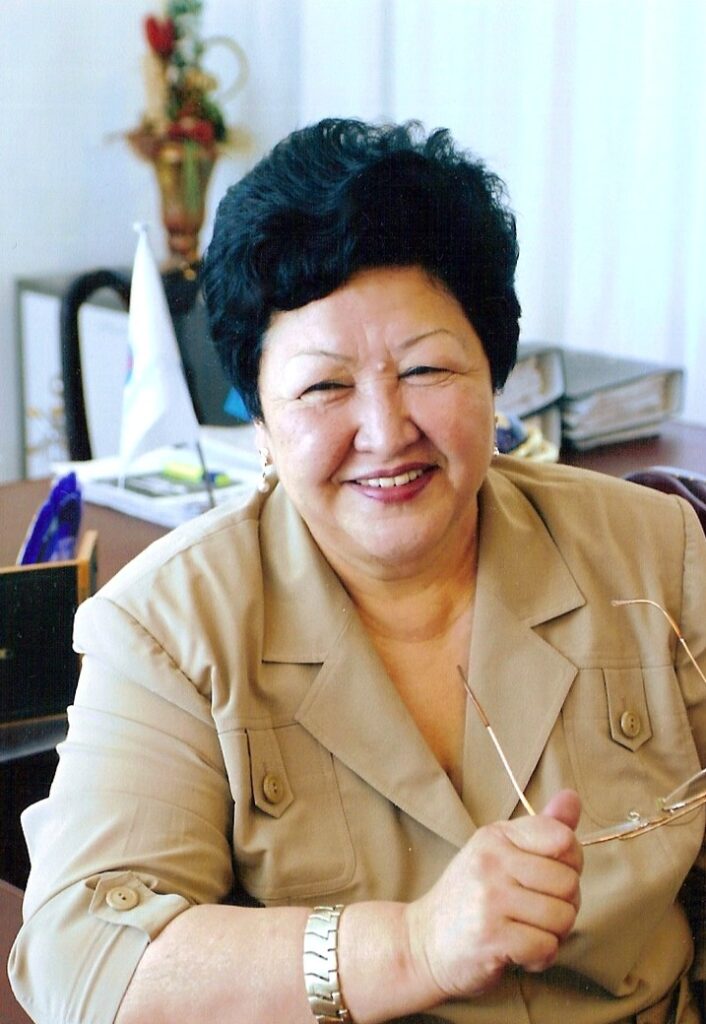
B I O G R A P H Y
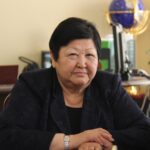 Kunanbaeva Salima Sagiyevna was born in 1943 in Ushtobe,Taldykorgan region. After graduating from secondary school in 1961, she entered the Almaty Pedagogical Institute of Foreign Languages, which she graduated from in 1965.
Kunanbaeva Salima Sagiyevna was born in 1943 in Ushtobe,Taldykorgan region. After graduating from secondary school in 1961, she entered the Almaty Pedagogical Institute of Foreign Languages, which she graduated from in 1965.
- 1965-1967 – English language teacher at the secondary school in Dmitrievka.
- 1967-1970 – English language lecturer at the Foreign Languages Department.
• 1970-1974 – Postgraduate studies in “Methods of Teaching Foreign Languages” at APIIYA.
• 1975-1992 – Lecturer, senior lecturer, head of the English Grammar Department, associate professor of the English Teaching Methodology Department, head of the English Teaching Methodology Department.
• 1992-1998 – Vice-rector for educational work.
• 1992 – Awarded the degree of Doctor of Philological Sciences.
• 1996 – Awarded the academic title of Professor.
• 1997 – Academician of international academy of sciences of higher education.
• Since 1998 – Rector of KazUIR&WL named after Abylai Khan.
• 2013 – Awarded the title of Corresponding Member of the National Academy of Sciences of the Republic of Kazakhstan (NAS RK).
• 2017 – Awarded the title of Academician of the National Academy of Sciences of the Republic of Kazakhstan (NAS RK).
Salima Sagiyevna Kunanbayeva is closely associated with the transformation of APIIYA into the Kazakh University of International Relations and World Languages named after Ablai Khan and its qualitative development towards entering the international educational space. Today, KazUIR&WL named after Abylai Khan is a major scientific and educational complex specializing in the training of personnel in the humanities, foreign languages, and international profile. KazUIR&WL named after Ablai Khan is the only university in the republic that provides professional training in 16 world languages. She developed the first concept for the university’s development, according to which the range of specialties (especially international ones) expanded annually, faculties of the university were opened, a linguistic lyceum-college, a lyceum-college of international tourism, a college of international service and management, and a pedagogical college of foreign languages. As a rector and also the chairman of the republican educational-methodical section for the group of specialties “Foreign Languages”, Kunanbayeva Salima Sagiyevna carried out the structural and substantive reform of the foreign language education system in the university and spread this experience in the republic. Under her leadership, the scientific and methodological foundations of foreign language education were revised in accordance with international standard requirements, which was reflected in her monograph “Modern Foreign Language Education: Methodology and Theory” (Almaty, 2005), which became the conceptual basis for the “Concept of the Development of Foreign Language Education of the Republic of Kazakhstan”. She is the leader and developer of the scientific and methodological school of foreign language education, and under her guidance, several dozen dissertations were prepared and successfully defended for the pursuit of scientific degrees in philology and pedagogy. She has prepared and published more than 200 scientific papers, including 13 monographs and 9 study guides on topical issues of modern teaching methods of foreign languages, cognitive linguistics, and translation studies.
A W A R D S
MAIN RESEARCH AREAS: SCIENTIFIC SCHOOL
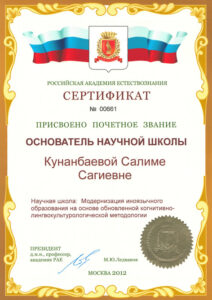 Within the scientific school led by Kunanbayeva S. at the Kazakh University of International Relations and World Languages named after Ablai Khan, researchers are expanding the profile component of bachelor’s, master’s, and doctoral educational programs in foreign and international directions in line with modern labor market demands and taking into account international standard requirements for three-level specialist training.
Within the scientific school led by Kunanbayeva S. at the Kazakh University of International Relations and World Languages named after Ablai Khan, researchers are expanding the profile component of bachelor’s, master’s, and doctoral educational programs in foreign and international directions in line with modern labor market demands and taking into account international standard requirements for three-level specialist training.
The latest developments of the scientific school under the leadership of S.S. Kunanbayeva include a technology-management and substantive-professional standard program for situational-communicative practice, basic foreign language, and study complexes for minors, continuous throughout the years of study. Textbooks and teaching aids have been prepared for three-component training of modification programs in a foreign language.
The main and universal principles that define the methodological basis of the educational complexes recognize the following basic approaches:
a) Modeling and presentation of educational material in a block-module format (CEFR) based on the main registers of professional communication spheres (professional-industry communication);
b) The sequence of organization and inclusion of educational material in the process of active assimilation should be in line with complex requirements for the level of language competencies according to the levels of the National Standard of Foreign Language Proficiency, as adapted from the European scale system of language competencies;
c) Ensure in the technological system of professional-industry foreign language education a targeted orientation of the educational process towards the sequential formation of a system of communicative language competencies, starting from professionally oriented and transitioning to professionally based and professionally identifying (taking into account competencies according to specializations and profiles);
d) Within the framework of three-component training of modification programs in a foreign language and basic professional-foreign language competencies, the main type of foreign language competence is generalized and consistently formed – intercultural-communicative industry competence. In this regard, the standard programs include substantive-industry subprograms of profile-industry foreign language education. The subject content of the foreign language education program is contextually based on the main communication practices within the tasks of the future profession.
WORKS
DEVELOPMENT OF STATE DOCUMENTS AND CONCEPTS
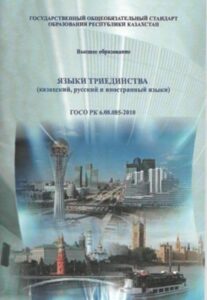
State Compulsory Education Standard: Trilingualism (2010)
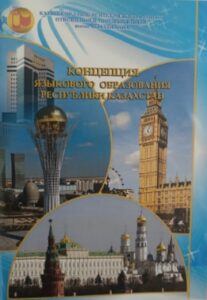
THE CONCEPT OF LANGUAGE EDUCATION IN THE REPUBLIC OF KAZAKHSTAN (2010)
DISSERTATIONS SUPERVISED BY ACADEMICIAN S.S. KUNANBAYEVA
- Kulibayeva, D.N. Methodological Foundations of Managing Professionally-Oriented Educational Systems in International-Type Schools [Text]: Doctoral dissertation in pedagogical sciences: 13.00.08: defended on February 23, 2007 / Dinara Nursultanovna Kulibayeva; Kazakh-German University. – Almaty, 2007. – 307 p. – 0507RK00041.
- Chaklikova, A.T. Scientific and Theoretical Foundations for Developing Intercultural Communicative Competence in the Context of Informatization of Foreign Language Education [Text]: Doctoral dissertation in pedagogical sciences: 00.02: defended on March 30, 2009: approved on September 25, 2009 / Asel Turarovna Chaklikova; Kazakh-German University. – Almaty, 2009. – 272 p. – Bibliography: p. 247-272. – 0509RK00072.
Video lectures, video project protection
Materials for students (lectures, presentations, assignments)
- Introductory Lecture
- Conceptual and Methodological Foundations of Modernizing Foreign Language Professional Education (Part 1)
- Conceptual and Methodological Foundations of Modernizing Foreign Language Professional Education (Part 2)
- Functional Characteristics of “Modeling” as a Method of Knowledge: Modeling the Subject Matter of Foreign Language Education
- Competency Modeling in Contemporary Foreign Language Professional Education: Methodology and Technology of Competency Modeling